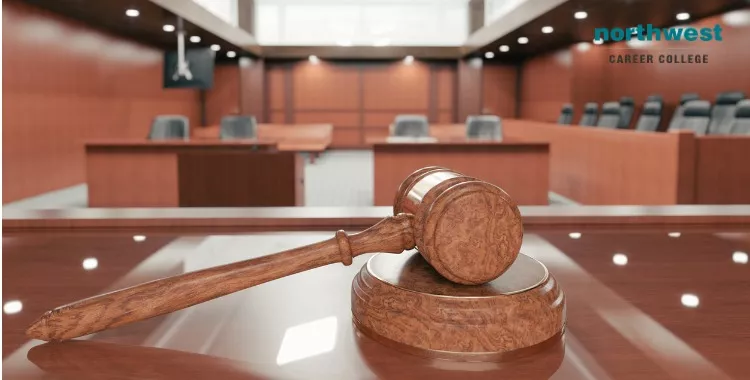5 common legal defenses in the U.S. legal system
- Criminal Justice
- March 5, 2025
- 3.9k views
- 6 min read

There are many different legal defenses that can be used in the U.S. legal system. Some of them are more common than others, but all of them can be effective in certain situations.
In this blog post, we will discuss five of the most common legal defenses in the United States. Keep in mind that every case is unique, so you should speak to an attorney if you need specific advice for your situation.
Table of Contents
What is a criminal defense?
A criminal defense is a legal argument that is raised in order to contest the charges against a defendant. A successful criminal defense can result in a dismissal of the charges, an acquittal (not guilty verdict), or a finding of not guilty by reason of insanity.
It should be noted that, under the U.S legal system, the defense never has to prove innocence. Rather, the prosecution must prove guilt beyond a reasonable doubt. This is a high burden of proof, and it exists to protect the rights of the accused.
Now that we have a general understanding of what a criminal defense is, let’s take a look at some of the most common defenses that are used in the United States.
Dismissal of charges
One of the most common defenses is a motion to dismiss the charges. This can be done for a variety of reasons, such as lack of evidence or violation of the defendant’s constitutional rights.
Dismantling the charges piece by piece is a strategy that is often used in criminal cases. The goal is to poke holes in the prosecution’s case and create reasonable doubt.
This can be done by challenging the credibility of witnesses, attacking the evidence, or pointing out inconsistencies in the prosecutor’s argument.
The insanity defense
This defense is based on the idea that the defendant cannot be held responsible for their actions because they are not mentally capable of understanding the consequences of their actions.
To use this defense, the defendant’s mental state at the time of the crime must be called into question. This can be done by presenting evidence of the defendant’s mental illness or showing that the defendant was under the influence of drugs or alcohol at the time of the crime.
A favorite of films and television shows, the insanity defense is actually quite rare. In most cases, it is unsuccessful. This may be because it is hard to prove that the defendant was not in control of their actions at the time of the crime.
The self-defense claim
This defense argues that the defendant committed a crime because they were acting in self-defense.
To use this defense, the defendant must show that they reasonably believed that they were in danger of being harmed by the victim. The defendant must also show that they used only the amount of force necessary to protect themselves from harm.
The viability of this defense depends on the state in which the crime was committed. In some states, a self-defense claim can be used to justify all types of crimes, including murder. In other states, it can only be used to justify certain types of crimes, such as assault.
The diminished capacity of defense
This defense is based on the idea that the defendant was not able to fully understand their actions because of a mental illness or defect. This can be used as a defense for all types of crimes.
The diminished capacity defense is often used in conjunction with an insanity defense. It can also be used on its own if the defendant does not meet the criteria for an insanity defense.
The difference between these two defenses is that an insanity defense claims that the defendant was not able to understand that their actions were wrong. A diminished capacity defense claims that the defendant was not able to fully understand their actions.
In order for a diminished capacity defense to be successful, the defendant must prove that they had a mental illness or defect at the time of the crime.
A plea bargain
A plea bargain is an agreement between the prosecutor and the defendant in which the defendant pleads guilty to a lesser charge in exchange for a lighter sentence.
Plea bargains are often used in cases where there is not enough evidence to convict the defendant of the original charge. They are also used when the defendant agrees to testify against someone else in exchange for a reduced sentence.
Plea bargains can be beneficial for both the defendant and the prosecution. The defendant avoids a more serious charge and the possibility of a longer sentence, while the prosecution is able to avoid the time and expense of a trial.
There are some drawbacks to plea bargains, however. The defendant gives up their right to a trial, and they may not be able to appeal their sentence. Additionally, the prosecution may use plea bargains to get defendants to plead guilty to crimes they did not commit.
Learning the ins and outs of the legal system
The criminal justice system in the U.S. can be a confusing but rewarding area of study and work.
If you’re interested in a career in law enforcement or want to better understand how the criminal justice system works, consider studying criminal justice here at NCC.
Our Criminal Justice Program is designed to give you a well-rounded education that will prepare you for a career in the field, or for further study at the graduate level.
Criminal justice is a multifaceted field, and our program reflects that. You’ll take courses in sociology, psychology, political science, and of course, criminal justice itself.
Qualifying for your future
Gaining a qualification from our Criminal Justice School puts you in an excellent position to access a variety of employment opportunities as you look for one that suits your skills and interests.
At Northwest Career College, our Criminal Justice instructors include licensed, practicing attorneys and degree instructors able to teach, not only the law but also to guide our students in the many ways a criminal justice graduate integrates into a Las Vegas legal profession.
As part of our Criminal Justice Program, you’ll visit courts, jails, meditation centers, and more to experience first-hand the law in action, which will make your criminal justice training applicable to the Las Vegas legal system.
Northwest offers a flexible blended program with all criminal justice classes Las Vegas law classes taught on campus by an attorney and general education courses offered online. Our experienced instructors are on-campus to review and support your learning experience at all times.
Call us at (702) 403-1592 to speak to one of our enrollment team about joining our Criminal Justice Program today!




